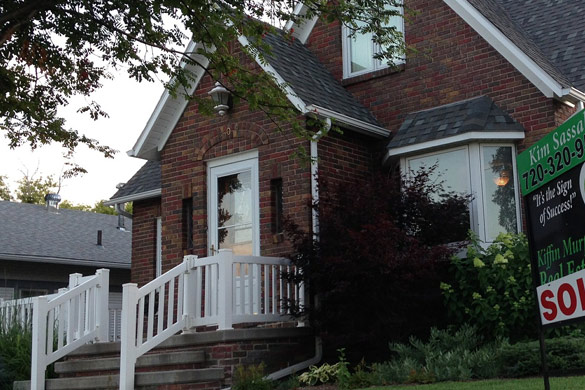Get a bigger tax return now and pay less tax later. Sound like a bargain?
Under certain circumstances, a portion of home improvements may be deducted from your yearly taxes. If that doesn’t catch your attention, the money you can save when it’s time to sell your home will.
homeandgardeningguide.com gathered information on how home improvements for a home-based business, as medical expenses, and for the sale of your home can help you maximize your current tax season and help you save money when you sell your home.
What Home Improvements Are Tax Deductible?
A home improvement (for tax purposes) is work that substantially adds value to your home, extends its useful life, or modifies it for new uses or activities. Such home improvements include:
• Adding a new bathroom
• Adding or expanding a room
• Installing a deck
• Installing a driveway
• Installing walkways
• Replacing the roof
• Erecting a fence
• Upgrading the electrical system (wiring)
• Making energy efficient upgrades
• Upgrading the plumbing
• Upgrading the kitchen
Here’s the spoiler. If your home is used solely as your personal residence, you are not allowed to deduct the cost of home improvements. In this scenario, home improvement costs are nondeductible personal expenses. However, the property tax you pay is deductible.
This is relevant because when you make home improvements that increase your property’s value, your property taxes will generally increase in tandem.
Don’t be discouraged though, when the time comes to sell your home, the cost of your home improvements are added to the tax basis of the home, reducing the amount of taxes you must pay when selling your home at a profit (we’ll address this in more detail later in the article).
For now, let’s discuss how to benefit from your home improvements in the current tax season.
1. Home Business – Deductible Improvements
If you operate a business from your home, the improvements you make that benefit the entire home can be partially deducted from your taxes in the year the improvements were made.
A great example of a partial deduction is as follows:
If your business occupies 25% of your home’s square footage and that space is only used for business purposes, you can deduct 25% of the home improvement costs when those costs directly impact the space allocated for your business.
So, if you spent $4,000 to upgrade your home’s heating and air conditioning last year, 25% of that or $1,000 may be used as a deduction on last year’s taxes.
The remaining $3,000 may qualify to be applied to the tax basis of your home when you sell it.
An example of a full deduction is:
Upgrades made exclusively to the space used for business purposes, e.g., the installation of a shelving unit or floor replacement, can have the full value deducted from that year’s taxes.
The Internal Revenue Service has strict qualifying guidelines for home business space, learn more at irs.gov/newsroom/must-know-tips-about-the-home-office-deduction
2. Medical Expenses – Deductible Modifications
If you have been diagnosed with a medical condition or have a disability that requires you to make modifications to your home, these expenses can be written off as medical expenses.
These modifications may include:
• Installing ramps for access
• Lowering cabinets
• Widening doors
• Installing handrails
• Installing lift chairs
Note that if the improvements add to the value of the property, the cost of the improvement is reduced by the increase in the value of your property. The difference is considered a medical expense. And if the value of your property does not increase from the improvement or modification, the entire cost can be calculated as a medical expense.
For more information regarding medical expenses, visit irs.gov/publications/p502
3. Sell Your Home – Deductible Moving Expenses
The ultimate home improvement may be selling your current home and buying a better one!
When You Sell Your Home – The “tax basis” is the term used for the profit you make. For tax purposes, home improvements made to the house – while you owned it – reduce the IRS calculated profit you have to claim in the sale of the home.
This translates to less money on which you can be taxed. In addition, you only get taxed on the profit if your gain as a single person is over $250,000 and $500,000 for a married couple filing jointly. Take a look at how this is calculated:
| $300,000 | Purchase price for your home |
| -$100,000 | Qualified home improvements |
| =$200,000 | New tax basis |
| $700,000 | Selling price of your home |
| -$300,000 | Purchase price for your home |
| =$400,000 | Profit |
| -$100,000 | Qualified home improvements |
| -$250,000 | Single person exemption |
| =$50,000 | Total taxable profit |
Moving Expenses – If you are active military personnel and must move due to permanent reassignment, the following may qualify as deductions:
• Transportation
• Lodging
• Shipping
• Storage
Note that your moving dates should reasonably coincide with your assignment start date. Simply stated, any expense you would not normally have (if it weren’t for the move) may be an eligible deduction.
For Non-Military taxpayers, this moving expense deduction has been suspended from tax years 2018 through 2025. For further reading on deductible moving expenses and who is eligible, visit irs.gov/publications/p521
Maximize Your Tax Refund
By making certain home improvements, you can increase your current tax refund or benefit from a lower tax basis when you sell your home.
In this article, you discovered how your home-based business, medical expenses, and selling your home can increase your tax return or decrease taxes owed.
The government offers tax breaks and deductions as incentives. If you do not take advantage of them, you are losing money and passing up exceptional opportunities.
Disclaimer:
As federal tax codes and regulations may change from year to year, we at Home & Gardening Guide strongly recommend consulting a tax specialist before attempting to make any deductions in reference to the above stated material.
Sources:
https://www.irs.gov
https://www.energy.gov/science-innovation/energy-efficiency
Visit http://www.homeandgardeningguide.com/improvement/finances/ for more home finance articles, resources, and tips.
The post 3 Tax Deductions for Home Improvements appeared first on http://www.homeandgardeningguide.com




No comments:
Post a Comment